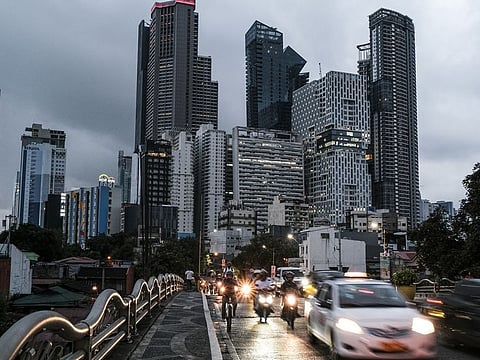Philippines' GDP growth stumbles as high prices, rates bite
Second quarter growth missed estimates ranging from 5%-7.6%

Manila: The Philippine economy expanded much slower than expected in the second quarter, reeling from the impact of above-target inflation, borrowing costs at a 16-year high and waning global demand.
Gross domestic product in the three months through June rose 4.3 per cent from a year earlier, the statistics authority said on Thursday.
That's below all 24 estimates in a Bloomberg survey with a median forecast for 6 per cent and compares with 6.4 per cent growth in the first quarter.
Barring the pandemic years of 2020 and 2021, the April-June annual expansion was the slowest since 2011. The economy fell 0.9 per cent quarter-on-quarter, against a median estimate for 0.6 per cent gain.
Last quarter's GDP was "tempered by high commodity prices, lagged effects of interest rate hikes, contraction in government spending, and slower global economic growth," according to a joint statement of Philippine economic managers. The peso fell to a nine-month low after the data. Stocks traded 0.4 per cent lower.
The disappointing performance underscores the challenges confronting one of Asia's bright stars as inflation hovers above the central bank's 2 per cent-4 per cent target while interest rates remain among the highest in Southeast Asia. First-half GDP rose 5.3 per cent against the target of a 6 per cent-7 per cent full-year expansion.
Government spending, which slumped 7.1 per cent last quarter from a year earlier, will accelerate "to allow us to recover our growth momentum," the officials said in the statement. Growth in household consumption eased from 6.4 per cent in the first quarter.
Philippine central bank Governor Eli Remolona, who will deliver his first policy decision as the head of the monetary board next week, has cautioned against raising rates too much.
His predecessors raised the policy rate by 425 basis points since May last year to 6.25 per cent to tamp down 14-year high inflation. Price gains have cooled for a sixth straight month in July.
"The GDP data cements our view that the BSP will refrain from hiking again and hold rates through early next year," said Domini Velasquez, chief economist at China Banking in Manila. "The BSP may have to consider a reserve requirement ratio cut to provide much needed support. The government will also need to address bottlenecks to hasten spending."
The peso fell as much as 0.4 per cent to 56.45 per dollar, the lowest since December. The weak growth is adding pressure to the currency, already among the worst performers in Asia this quarter, with a loss of more than 2 per cent.



